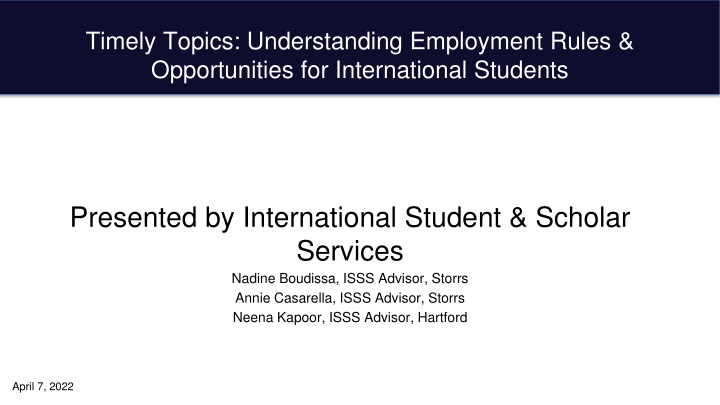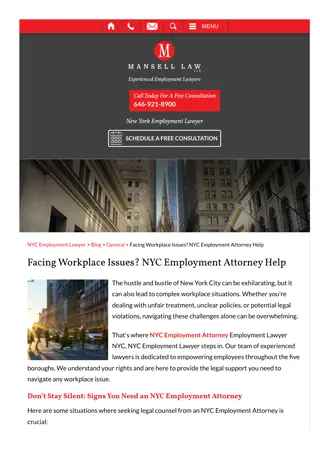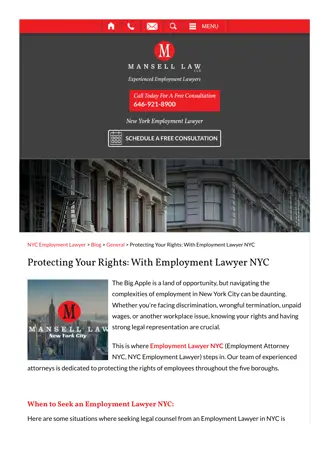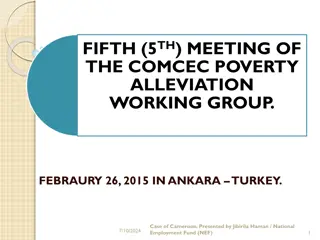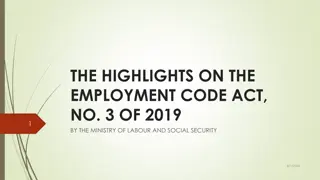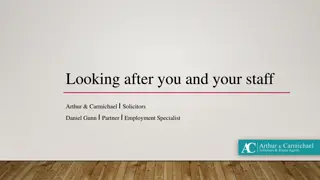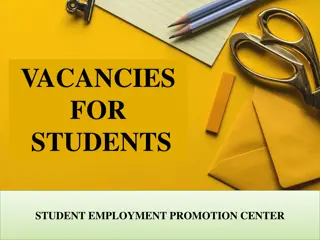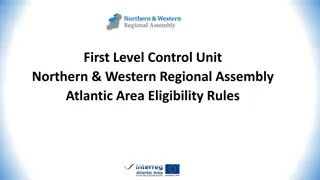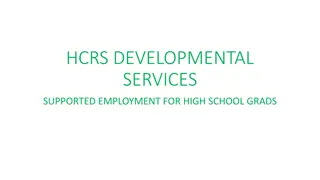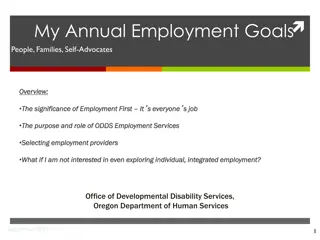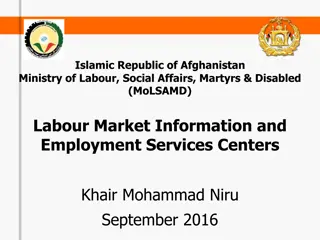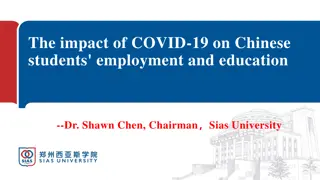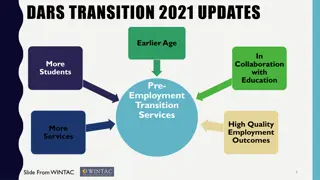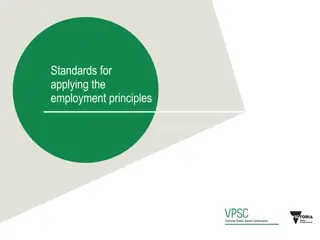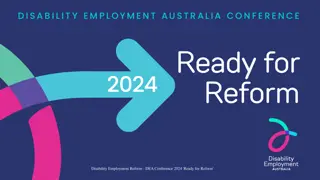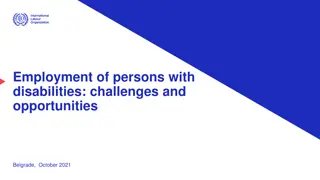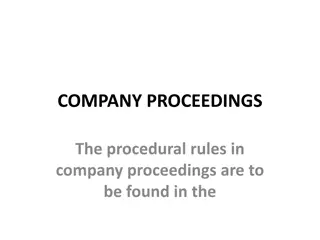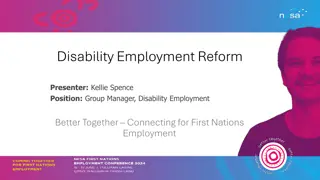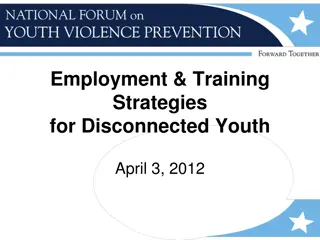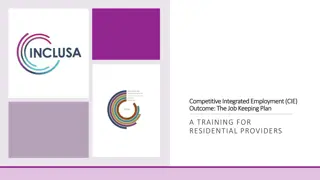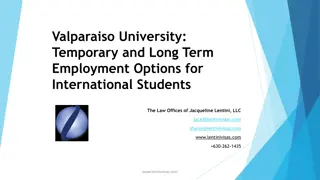Employment Rules & Opportunities for International Students
This event presented by International Student & Scholar Services covers topics like F-1 and J-1 student basics, on-campus employment rules, practical training opportunities, and visa basics. Learn about employment restrictions, responsibilities, and benefits for F-1 and J-1 visa holders. Discover statistics on international students and explore on-campus employment options. Get insights on completing degree programs and understanding the rules governing work authorization. Stay informed about visa regulations to ensure compliance while pursuing studies in the U.S.
Download Presentation

Please find below an Image/Link to download the presentation.
The content on the website is provided AS IS for your information and personal use only. It may not be sold, licensed, or shared on other websites without obtaining consent from the author.If you encounter any issues during the download, it is possible that the publisher has removed the file from their server.
You are allowed to download the files provided on this website for personal or commercial use, subject to the condition that they are used lawfully. All files are the property of their respective owners.
The content on the website is provided AS IS for your information and personal use only. It may not be sold, licensed, or shared on other websites without obtaining consent from the author.
E N D
Presentation Transcript
Timely Topics: Understanding Employment Rules & Opportunities for International Students Presented by International Student & Scholar Services Nadine Boudissa, ISSS Advisor, Storrs Annie Casarella, ISSS Advisor, Storrs Neena Kapoor, ISSS Advisor, Hartford April 7, 2022
Agenda F-1 student and J-1 student basics On-campus employment rules Curricular Practical Training Optional Practical Training and STEM OPT
International Student Statistics International F and J visa statistics: App. 1,433 international graduate students Storrs: 1021 Hartford/GBLC: 239 Stamford: 157 Avery Point: 8 Top countries: China (531), India (382), Bangladesh (50), Iran (47), South Korea (47)
F-1 and J-1 Visa Basics F-1 visa: Purpose of coming to the U.S. is to complete a program of study, usually a degree program. F-1 students at UConn: 1410 J-1 visa: Purpose of coming to the U.S. is to complete an exchange program. Exchange programs can take many formats, including degree program study. For today we refer to J-1 student programs, not visiting scholar programs. J-1 students at UConn: 23
F-1 and J-1 Visa Basics Rules and benefits for both programs are similar, but different vocabulary and small variations to the rules. For F-1 and J-1 student programs, completing the degree is priority. As a result, employment rules are very restrictive. Who is responsible to know the employment rules? Student must know and work within the given restrictions Employer reviews work authorization documents through I-9 process and must also ensure they employ the student within those restrictions. ISSS reports violation of restrictions through SEVIS
On Campus Employment On Campus Employment is: Work that takes place on campus, with UConn as the employer. Graduate Assistantship, student labor, special payroll. Work that takes place on campus, but employer is not UConn, when the employer is providing direct student services. Starbucks in the bookstore, Subway in the SU.
On campus employment Work that is off-campus, where the work site is educationally affiliated with UConn. Educationally affiliated means: Associated with the school's established curriculum Related to contractually funded research projects at the post-graduate level Examples: GAs with off-campus work sites, work at off campus labs under joint research agreements. Student/advisor should complete approval form through ISSS. ISSS may require a copy of the contractual agreement facilitating the employment.
On campus employment Hours are restricted: Up to 20 hours/week during academic term, more than 20 hours/week during summer/winter break. If student will graduate in summer/winter then they are also restricted to 20 hours. Exceeding these work hours is a visa status violation and can lead to the termination of the student s I-20/DS-2019 form and visa status.
On Campus Employment J-1 Students F-1 Students Work permission is built into visa (no separate authorization needed) ISSS Work authorization letter required before they can start working. This letter must be renewed with each offer letter. New students may begin up to 30 days before first day of classes New students can begin as of first day of DS-2019 as long as they have written ISSS authorization. Transfer-in students may work on- campus as long as their SEVIS record is released to UConn, student submits arrival documents to ISSS and the student has the UConn I-20. Must end when student completes their degree. For most students, including GAs, this is the last day of the last term. Must end when student completes their degree For most students, including GAs, this is the last day of the last term.
CPT What is it? Curricular Practical Training (CPT) is a work benefit that allows students to participate in off campus Internships/Externships Volunteering Degree milestones Clinical/Practicum/Field placements Other experiential learning opportunities: Entrepreneurial program
CPT What is it? It is part of the curriculum of the academic program and directly related to the academic major listed on the student s I-20. CPT must be authorized for both paid and unpaid experiences. Completion of the training must be considered academic work and may not delay completion of the degree program.
CPT How is the training curricular? Internship earns credit* Required clinical placements/field work Internship milestone required to graduate* Some entrepreneurial programs * must be on/added to the plan of study
CPT How is the training curricular? Internships required for thesis or dissertation research must carry course registration representing the research or internship AND confirmation of direct application of the internship to dissertation/thesis. In some cases, on-campus internships must also be authorized by CPT.
CPT Who is eligible to apply? Enrolled FT for 2 academic semesters* Must take place before student finishes degree Has an offer letter or established placement (clinical site) Must complete ISSS CPT workshop before applying *Exceptions are provided for students enrolled in graduate studies that require immediate participation in curricular practical training. .
CPT What is the role of the advisor? Academic Advisor will complete a recommendation for the student confirming: How the training is curricular If earning credit, list the course name and number of credits. If required for thesis/dissertation, explain the direct relevance.*additional form If contractual agreement, provide the name of the contractual agreement. If UConn entrepreneurial program, name the UConn entrepreneurial program. Name of the CPT employer and location
CPT What are some rules related to CPT? Students who received 365 days of full-time CPT (20+ hrs/week) are ineligible for OPT. CPT is authorized by ISSS and must be approved BEFORE your internship or placement begins. Duration and work hours of CPT are determined by the course or curricular requirement. Work hours for CPT do not count toward max. 20 hour per week requirement.
CPT What is it not? Teaching at other Universities - unless the program explicitly requires teaching as part of the degree program or for a particular course that explicitly requires teaching. Permanent position
OPT A benefit of F-1 status that allows students to gain experience in major field of study 12 months per degree level Extension possibilities Requires at least one year of FT study in US to be eligible May be used pre or post completion (or combo) Workshop required before applying Fees: $410 USCIS, $150 ISSS
OPT Eligibility: - Any work done during OPT must be directly related to academic major - Pre-OPT may be PT only during the semester - Post-OPT has an unemployment cap of 90 days
OPT What is the role of the academic program? - Academic advisor provides info to ISSS as part of student s application - After graduation, you might hire students on OPT. - If unpaid, confirm with Labor Relations to ensure it is compliant with labor rules, and if so, issue gratis appointment offer letter.
OPT Timeline: Pre-Completion: may apply up to 90 days prior to requested start date Post-Completion: may apply up to 90 days prior to program end date USCIS processing time approx 90 days
OPT Reporting Requirements: - OPT is part of the F-1 visa so students must still report info to their sponsoring school. - UConn students on OPT report to ISSS. - A non-UConn student doing OPT at UConn reports to their school, not to ISSS.
STEM 24-month extension of post-completion OPT Only available for STEM majors Based on gov t list of eligible CIP codes Employer during STEM must be STEM-eligible too Employer must be enrolled in e-verify Training Plan is required UConn is not a STEM employer (no e-verify)
